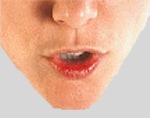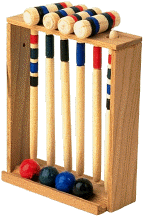- do the job,
- convince people that it’s sufficiently worthwhile (in terms of functionality) for them to adapt to,
- provide the comfort zone for them to adopt it as their standard landscape.
I have to thank the poster Socinian for drawing my attention to Croquet, which looks to be a key element in the revolution awaiting us. Why? Because in many ways it emulates the flipchart… and even does a bit more! It creates flexible 3D space (potentially the comfort zone, but that will depend to some extent on the use of graphics to create the right atmosphere) and within that space it allows for multiple and varied display opportunities (thus emulating the flipchart), which can be used in classical or non-classical ways. Its peer-to-peer architecture means that actions and activities can be freely initiated and shared, objects and creations can be explored and developed in common. (At least that’s the impression I get from the 90 minute video presentation). It also appears to integrate communication technology in a way that (to my naïve view) will potentially put Breeze and its competitors in the Model-T class. In short, it respects the personality of all the users, whether trainers, facilitators or learners. It also breaks down the limits on the kinds of actions one can engage in during learning sessions, while at the same time highlighting the social dialogue-based nature of all significant knowledge exchange and development, opening up the possibilities for deployment of imagination, initiative and fantasy, and thereby highlighting one of the constraints of “mere” simulation (where the rules are never those of normal human behavior since freedom of initiative is bound by the constraints of the program). And of course it looks nicer than the nicest flipchart.
But if it’s “better” and broader than simulation and other more traditional e-learning modules (from drills to interactive video) and more powerful than a flipchart, it doesn’t invalidate them or cancel them out: it can integrate them into its working space, re-establishing just proportions in a (virtually) human setting and giving them the value they deserve as tools within a process and environment rather than be-all and end-all solutions. As you may surmise, I’m looking forward to seeing Croquet on all our desktops and am beginning to look at ways to harness its power for meeting specific needs.
But for all its breadth Croquet won’t do the whole job, even though it appears to come close. Nobody wants to live their whole life in a 3D graphic environment. Alice herself had other things to do than dream of the world on the other side of the looking glass. Another exciting find that may help define the future is ODEO, an application that allows anyone to use audio for asynchronous dialogue and personal podcasting. It's absolutely simple to use. For me it already provides a viable and effective (though partial) answer to the need for e-coaching, especially in the fields I’m most concerned with: communication skills. 
We are (at least for others) our voice. Voice has long been neglected in learning and the arrival of the Web has exaggerated in many ways the domination of the written word, thereby adding to the neglect of voice. (One of the nice things about flipcharts is that they recode talking as writing and therefore require speech input). ODEO – absolutely free of charge – allows anyone to communicate with voice or already recorded audio to selected people (e.g. a group of learners) or to the whole world (podcast) and, in bloglike manner, to allow those who receive the message to reply vocally. It’s asynchronous (in contrast to the totally synchronous Croquet) and therefore makes it possible to create an ongoing and controled vocal dialogue, to plan phases of work and practice. In short, it can be a vital tool in coaching learners on two major fronts: evolution of the expressive personality (social skills and personal image, an unrecognized key to success and even to "good grades") and mastery of domain-linked discourse (the basis of authentic learner output, something that has always been neglected in knowledge-based learning strategies, but which is one of the key outcomes of informal learning).





3 comments:
I'm glad my reference was helpful. Obviously I'm won over by the technology as well.
:-)
The annotation system built into Croquet enables one to leave voice-recorded annotations attached to anything visible in the Croquet world. This isn't quite podcasting. Nevertheless, since the underlying code is visible and user editable and a web server is already available for the Squeak part of Croquet, syndicating a subset of the voice-recordings shouldn't be too hard. ;-)
Also, any academic and/or industry members or individuals who think that their organization would like to become members of the now forming "Croquet Consortium" can e-mail their interest to us at
"memberinfo /at/ croquetconsortium.org"
(with /at/ replaced by @).
Darius,
Thanks again for pointing me in the direction of Croquet. The vocal annotation feature sounds (no pun intended) as if it does one important part of the job. I expect that sharing of annotations will somehow be possible. I also have little doubt that Croquet, already very inclusive, will tend towards increasingly integrated inclusiveness. But even today -- if I can judge from my initial viewing of Croquet -- a dialogue tool like ODEO (which itself will certainly evolve and become more flexible), installed as it is on a web server, can be made available as a screen object inside the Croquet environment.
So while the world on the other side of the looking glass isn't yet perfect, it already has a lot to offer.
Still, I have no idea yet what deployment of Croquet implies. Looking forward to finding out. "Curioser and curioser" (describing my appetite for further knowledge rather than the strange world Alice discovered).
Post a Comment